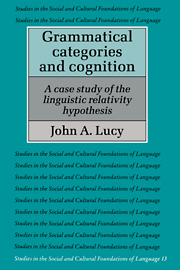
-
Select format
-
- Publisher:
- Cambridge University Press
- Publication date:
- 19 January 2010
- 02 July 1992
- ISBN:
- 9780511620713
- 9780521566209
- Dimensions:
- Weight & Pages:
- Dimensions:
- (228 x 152 mm)
- Weight & Pages:
- 0.32kg, 228 Pages
You may already have access via personal or institutional login
Book description
Grammatical Categories and Cognition uses original, empirical data to examine the Sapir-Whorf linguistic relativity hypothesis: the proposal that the grammar of the particular language we speak affects the way we think about reality. The author compares the grammar of American English with that of Yucatec Maya, an indigenous language spoken in south-eastern Mexico, focusing on differences in the number marking patterns of the two languages. He then identifies distinctive patterns of thought relating to these differences by means of a systematic assessment of memory and classification preferences among speakers of both languages. The study illustrates the distinct approach to empirical research on the linguistic relativity hypothesis which Lucy develops in a companion volume Language Diversity and Thought.
Reviews
‘… the importance of [Lucy’s] work lies primarily ... in his re-opening discussion and inquiry on the linguistic relativity hypothesis. Although others in the past few decades have also called attention to the linguistic relatively hypothesis, for various reasons attention to it has been of marginal concern … Lucy’s work will surely open the conversation. Its reopening is long overdue.’Times Higher Education Supplement
Contents
Metrics
Altmetric attention score
Full text views
Full text views help Loading metrics...
Loading metrics...
* Views captured on Cambridge Core between #date#. This data will be updated every 24 hours.
Usage data cannot currently be displayed.
Accessibility standard: Unknown
Why this information is here
This section outlines the accessibility features of this content - including support for screen readers, full keyboard navigation and high-contrast display options. This may not be relevant for you.
Accessibility Information
Accessibility compliance for the PDF of this book is currently unknown and may be updated in the future.


